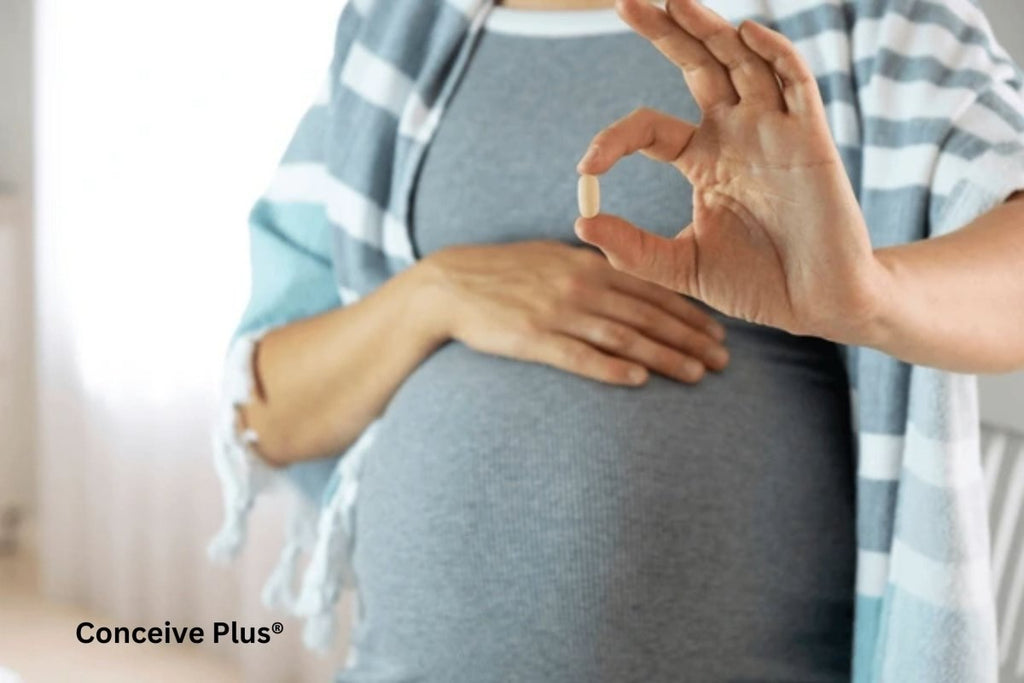Chewy Prenatal Vitamins with Iron For Healthy Pregnancy

The nutritional requirements of a woman's body increase during her pregnancy. Different nutrients play a vital role in supporting the health of the mother and the development of the baby during pregnancy. One such important nutrient is iron [1].
In some cases, even a balanced diet isn't enough to fulfill the iron requirements of the body during pregnancy. This is where the prenatal vitamins containing iron play their part. Among the wide variety of options available, chewy prenatal vitamins with iron are becoming increasingly popular.
These chewable prenatal vitamins are convenient and delicious and packed with essential nutrients to support the mother's and baby's health during pregnancy.
The Role of Iron in Prenatal Health
You will find iron in the ingredient list of most prenatal vitamins. This is because an adequate quantity of iron in the body is necessary for the mother's health and the health of the baby.
The Importance of Iron During Pregnancy
Iron helps produce hemoglobin, a protein in red blood cells responsible for carrying oxygen throughout the body [2]. During pregnancy, a woman's blood volume increases significantly to support the growing baby.
Studies show that women produce 20% to 30% more blood during pregnancy than normal [3]. This means the demand for iron also rises during this time. Maintaining adequate iron levels ensures that both mom and baby receive enough oxygen for the baby's healthy growth and development.

In addition to supporting oxygen transport, iron is also important for strengthening the mother's immune system. A stronger immune system during pregnancy reduces the risk of complications such as infection. Studies show that iron also helps the baby's brain development, ensuring proper cognitive function and overall growth [4].
Risks of Iron Deficiency During Pregnancy
Reports show that many women worldwide experience iron deficiency during pregnancy [5]. This deficiency can lead to serious health conditions like anemia. A woman experiences symptoms like fatigue, weakness, and shortness of breath when suffering from anemia.
Severe anemia increases the risk of preterm birth, low birth weight, and postpartum depression. Iron deficiency in the baby can result in developmental delays and lower cognitive abilities.
Iron Requirements for Pregnant Women
Normally, an adult male should get 8 grams of iron, and an adult female should get about 18 grams daily [6]. However, when a woman is pregnant, the body's requirements for iron increase.
To meet the increased demand, pregnant women need about 27 milligrams of iron per day [7]. Iron-rich foods such as leafy greens, red meat, lentils, and fortified cereals can significantly help many women obtain the recommended amount.
However, many women also struggle to meet the recommended levels through diet alone. This is where a pregnant woman requires iron-containing prenatal vitamins.
Gummy Prenatal Vitamins with Iron
Most dietary supplements come in the form of pills which some people find convenient, while others find it challenging to take them regularly. This is also the case with iron-containing prenatal vitamins. You can get prenatal pills with iron, but if you find it challenging to take pills regularly, chewable tablets are a great alternative.
Advantages of Gummy Prenatal Vitamins
Chewy prenatal vitamins with iron have gained popularity because they are easy to use and have a pleasant taste. For many pregnant women, swallowing large pills can be challenging, especially during the first trimester when nausea is common [8].
Gummies offer a more enjoyable alternative, making it easier for pregnant mothers to follow their daily routine of consuming prenatal vitamins. If you're looking for a more enjoyable way to meet your nutritional needs, consider exploring good chewable prenatal vitamins that combine essential nutrients with a delicious taste.

Another advantage of prenatal iron gummies is their gentler formulation. Some gummy prenatal vitamins use forms of iron that are easier on the stomach. This reduces the risk of digestive discomfort, such as constipation, which is often a side effect of traditional iron supplements.
Limitations of Gummy Prenatals with Iron
Gummy vitamins have many benefits but they are also not perfect. Many gummies contain lower iron levels than traditional pills, meaning they may not provide enough iron for women who are suffering from severe deficiency of iron.
Additionally, some manufacturers add sugar and artificial flavors to make their gummy vitamins taste better, which may be a concern for some expectant mothers trying to limit their sugar intake.
Overconsumption is also a risk when consuming prenatal gummies. Since gummies taste like candy, it can be tempting to eat more than the recommended dose. This practice can lead to an excess of certain vitamins and minerals and increase the risk of their toxicity [9].
Comparing Gummy Vitamins to Pills
Both gummies and pills have their pros and cons when it comes to convenience and effectiveness. There are many factors where prenatal vitamin gummies are better compared to pills, while there are also many factors where gummies fall behind.
Advantages of Gummies Over Pills
- Gummies are easier to chew and swallow, especially for women who experience nausea or have difficulty swallowing pills.
- The pleasant taste of gummies can make taking iron in prenatal gummies a more enjoyable experience, encouraging consistency.
- Gummy multivitamins are made in a way that they are easier to digest, reducing the likelihood of gastrointestinal discomfort.
Drawbacks of Gummies Compared to Pills
- Gummies may lack some essential nutrients or provide them in lower doses compared to pills.
- Some gummy vitamins include sugars or artificial ingredients which can be a concern for mothers following specific diets.
- Gummy vitamins tend to be more expensive than traditional pills.
Other Essential Nutrients in Prenatal Vitamins
In addition to iron, a pregnant woman needs many other essential nutrients for a healthy pregnancy. These are:
-
Folate
Folate or folic acid is essential for preventing neural tube defects, which affect the baby's brain and spine development. Studies show that adequate folic acid levels lower the risk of neural tube defects by up to 71% [10].
The recommended daily intake of folic acid is 400-600 micrograms. Most of the well-reputed prenatal vitamins manufacturers offer prenatal vitamins with folic acid to meet the demands of the mother's body during pregnancy.
-
Calcium and Vitamin D
Calcium and vitamin D work together to support the baby's bone and teeth development. They also help prevent maternal bone density loss during pregnancy. In severe cases, calcium deficiency can lead to preterm labor and abortion [11]. The recommended daily intake of calcium is 1,000 milligrams, while the recommended daily intake of vitamin D is 600 IU.
-
Omega-3 Fatty Acids
Omega-3 fatty acids, particularly DHA or docosahexaenoic acid, are vital for the baby's brain and eye development [12]. These nutrients also help reduce the risk of preterm birth and promote a healthy pregnancy.
-
Iodine
Iodine is essential for normal thyroid function and supports baby brain development. Deficiency in iodine during pregnancy can cause hypothyroidism, and it negatively impacts the development of the brain and the nervous system in the baby. The World Health Organization (WHO) recommends taking 150 micrograms of iodine daily for pregnant women.
-
Vitamin C and Zinc
Vitamin C boosts immunity and also helps with the absorption of iron. It is also important for the physical growth of the baby. Zinc supports the immune system and helps in cellular growth and repair. It also lowers the risk of preterm birth.
Tips for Choosing the Right Prenatal Vitamin
With so many options available, selecting the right prenatal vitamin can be a challenging task for any woman. Here are some tips to help you choose the right iron gummies for pregnancy:
- Check for Iron: When you are planning to buy iron-containing prenatal gummies, you must look at the ingredient list of the specific product so that you won’t end up buying prenatal without iron. Also, confirm that the iron quantity mentioned on the ingredient list is enough to fulfill your daily iron requirements.
- Look for Comprehensive Formulas: A good prenatal vitamin should include essential nutrients like folate, calcium, vitamin D, and omega-3 fatty acids. Prenatal with iron and folic acid and other nutrients supports a healthy pregnancy.
- Read Labels: Prefer prenatal gummies with minimal added sugars and artificial ingredients. Instead, go for those supplements with natural ingredients and free from ingredients that you are allergic to.
- Consult Your Doctor: Consult your healthcare provider to find a prenatal vitamin that aligns with your nutritional needs and pregnancy goals.
The Bottom Line
Iron is a pillar of prenatal health because it plays a vital role in supporting the health of both mother and baby during pregnancy. Gummy or chewy prenatal vitamins with iron offer a convenient and tasty way to meet these nutritional needs.
Chewy prenatal vitamins with iron are especially important for women who struggle with traditional pills. Gummy prenatals have plenty of advantages over traditional pills, but they also have some lackings that you need to consider before making any purchase decision.
In addition to iron, other nutrients like folate, calcium, vitamin D, and omega-3s are also essential for a healthy pregnancy. Choosing the right prenatal vitamin can complement a balanced diet and significantly improve nutritional balance during pregnancy.
Resources Used
- National Academies Press (US). (1990). Iron Nutrition During Pregnancy. Nutrition During Pregnancy - NCBI Bookshelf. https://www.ncbi.nlm.nih.gov/books/NBK235217/
- Abbaspour, N., Hurrell, R., & Kelishadi, R. (2014, February 1). Review on iron and its importance for human health. https://pmc.ncbi.nlm.nih.gov/articles/PMC3999603/
- Anemia and Pregnancy. (n.d.). Hematology.org. https://www.hematology.org/education/patients/anemia/pregnancy
- McCann, S., Perapoch Amadó, M., & Moore, S. E. (2020). The Role of Iron in Brain Development: A Systematic Review. Nutrients, 12(7), 2001. https://doi.org/10.3390/nu12072001
- Georgieff M. K. (2020). Iron deficiency in pregnancy. American journal of obstetrics and gynecology, 223(4), 516–524. https://doi.org/10.1016/j.ajog.2020.03.006
- Office of Dietary Supplements - Iron. (n.d.). https://ods.od.nih.gov/factsheets/Iron-Consumer/
- Peña-Rosas, J. P., De-Regil, L. M., Garcia-Casal, M. N., & Dowswell, T. (2015). Daily oral iron supplementation during pregnancy. The Cochrane database of systematic reviews, 2015(7), CD004736. https://doi.org/10.1002/14651858.CD004736.pub5
- Admin. (2021, December 9). Nausea During Pregnancy. American Pregnancy Association. https://americanpregnancy.org/pregnancy-symptoms/nausea-during-pregnancy/
- Wooltorton, E. (2003). Too much of a good thing? Toxic effects of vitamin and mineral supplements. CMAJ: Canadian Medical Association Journal, 169(1), 47. https://pmc.ncbi.nlm.nih.gov/articles/PMC164945/
- Czeizel, A. E., Dudás, I., Vereczkey, A., & Bánhidy, F. (2013). Folate Deficiency and Folic Acid Supplementation: The Prevention of Neural-Tube Defects and Congenital Heart Defects. Nutrients, 5(11), 4760. https://doi.org/10.3390/nu5114760
- Almaghamsi, A., Almalki, M. H., & Buhary, B. M. (2018). Hypocalcemia in Pregnancy: A Clinical Review Update. Oman Medical Journal, 33(6), 453. https://doi.org/10.5001/omj.2018.85
- Coletta, J. M., Bell, S. J., & Roman, A. S. Omega-3 Fatty Acids and Pregnancy. Reviews in Obstetrics and Gynecology, 3(4), 163. https://pmc.ncbi.nlm.nih.gov/articles/PMC3046737/















